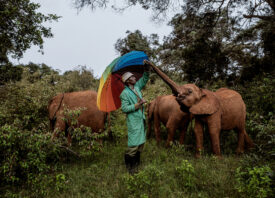Search this site
Tokyo Photographer Captures Interesting Characters at Shinobazunoike Lotus Pond
 A former dancer, 20 years after a sex change operation.
A former dancer, 20 years after a sex change operation.
Japanese photographer Tsutomu Yamagata weaves together a tale of quirky characters and distinctive personalities in his series Thirteen Orphans. Observing along the lotus pond Shinobazunoike, Yamagata was fascinated by the curious people who passed by him. The black and white portraits are both forthright and incredibly vulnerable, the captions revealing small but significant details of each life. From a cross-dressing cancer patient dancing in public to a mother with a daughter who is “hikikomori”, each of Yamagata’s orphans are complex layers of identity and unexpected history. It is this chorus of contradictory elements—both strong and weak, lost and hopeful, angry yet gentle—that attracts Yamagata to this same location again and again.
 She lives with her 28-year-old daughter. The daughter is hikikomori (a young person who refuses to leave their home and cloisters themselves from society).
She lives with her 28-year-old daughter. The daughter is hikikomori (a young person who refuses to leave their home and cloisters themselves from society).
 Recruiter of day laborers. He picks up casual laborers in Ueno everyday.
Recruiter of day laborers. He picks up casual laborers in Ueno everyday.
 Last month he found out he has prostate cancer but he hasn’t told his wife yet.
Last month he found out he has prostate cancer but he hasn’t told his wife yet.
 He opened a small bar in Shinjuku. The bar is always crowded.
He opened a small bar in Shinjuku. The bar is always crowded.
 She comes for a walk once a month from Asakusa. She seldom sees her five sons.
She comes for a walk once a month from Asakusa. She seldom sees her five sons.
 She became a prostitute six months ago. She still gets money from her parents.
She became a prostitute six months ago. She still gets money from her parents.
 He is an Okinawa samisen musician and hides a tattoo on his chest.
He is an Okinawa samisen musician and hides a tattoo on his chest.
 She has run a bar in Asakusa for 30 years. The number of customers has decreased.
She has run a bar in Asakusa for 30 years. The number of customers has decreased.
This post was contributed by photographer and Feature Shoot Editorial Assistant Jenna Garrett.



